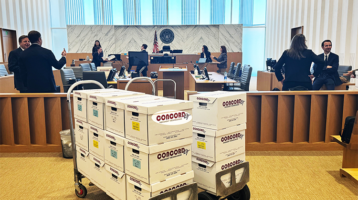[mp_row]
[mp_span col=”12″]
[mp_text]
Perils of E-Discovery Reflected in Sanctions Opinion
 Lest anyone think that hair-raising e-discovery sanctions opinions are a thing of the past, U.S. District Judge David Herndon of the Southern District of Illinois issued a blistering 51-page opinion (PDF) imposing nearly $1 million in punitive sanctions on the defendants in In re Pradaxa Products Liability Litigation on Dec. 9, 2013, and indicated that more sanctions are almost certainly on the way.
Â
The case is an example of how electronic data discovery generally, and implementing legal holds in particular, can be fraught with peril. Why is that? Lots of things can, and sometimes do, go wrong in handling EDD, even where the intentions of a party and its counsel are good. Companies are justifiably concerned about costs the costs of preservation itself, of retaining sophisticated e-discovery counsel as part of the legal team, and of a high-quality EDD vendor and, as a result may not put the most robust e-discovery process or team in place. Or they simply may not fully appreciate the need to do so.
Â
Plaintiffs’ counsel can seek broad discovery and try to impose broad preservation requirements; judges can be all too amenable to such requests. Defendants may in good faith make preservation decisions based on proportionality, but plaintiffs and the court may not share their view of what is proportional. Pressures to avoid over-preservation may clash dramatically with a courts broad view of the scope of discovery. Compelled certifications of completeness can set up defendants for sanctions if they turn out to be inaccurate.
Â
Companies and their counsel can face searing criticism and punishing sanctions when their efforts fall short in the view of the court, not to mention the resulting ill will that their failures (real or perceived) can generate with the judge who may decide the case or who, at a minimum, will have a significant impact on its outcome.
Â
So, what does all of this have to do with In re Pradaxa? If ever there were a case where many of these elements seemed to come together in a perfect storm, In re Pradaxa appears to be it. The courts Dec. 9 opinion deals with its findings that defendants 1) failed to preserve text messages on employees mobile phones that the court felt should have been preserved, including having failed to suspend an auto delete function that defendants had installed on the phones; 2) limited their legal hold to a grossly inadequate number of custodians, primarily in sales and marketing; 3) did not give a vendor responsible for collection full access to all folders on a shared drive; and 4) failed to put a key scientist on legal hold.
Â
Making matters worse, these findings came on top of a previous sanctions ruling in the case in September, apparently involving a litany of other problems, including repeated failures to meet agreed-upon and court-ordered time lines. The court also commented that “since its inception, this litigation has been plagued with discovery problems and that it was continually being called upon to address issues relating to untimely, lost, accidentally destroyed, missing, and/or just recently discovered evidence.
Â
In its Sept. sanctions ruling, the court stated that the apparent ongoing and continual problems were astounding and so numerous [its] distressing. In addition to concluding that the problems constituted a clear pattern of numerous and substantial violations of the Courts many orders, the court found that they demonstrated that the defendants have held this Court . . . in low regard and that they amounted to a contumacious disregard for its authority.
Â
The court initially imposed a relatively modest $29,540 fine and several remedial measures in its Sept. sanctions ruling, including a requirement that defendants certify the completion of their production of custodians files. It also warned that the court believes in progressive discipline should it have to visit sanctions issues again.
Â
By the time of its most recent sanctions ruling on Dec. 9, the court stated that it had run out of patience and was obviously not inclined to accept defendants various explanations for the apparently ongoing problems, which the court characterized as 1) placing the blame on others including third-party vendors, defendants IT departments, and their employees; 2) defendants and their counsels lack of experience in addressing litigation of this size; 3) unusual technical issues, such as accidentally erasing the contents of a hard drive; 4) the breadth of the discovery requests and the volume of documents produced (more than 3 million pages); and 5) defendants’ failure to discover gaps in their production process until they recently conducted a comprehensive review of the legal hold.
MISSED DEADLINES
Â
A major part of the overall problem in the case appears to have been the repeated missed document production deadlines, which appears to have created a toxic environment for the defendants before the court. It raises the question of whether the outcome may have been significantly different had defendants used predictive coding to expedite review and production (assuming they did not do so). With respect to the specific issues in the Dec. 9 sanctions order, the court concluded that they ultimately arose from the defendants having taken a too narrow and incremental approach to their legal holds.
Â
As for defendants failure to collect text messages and to suspend the auto-delete function they had installed on both company-issued and personal mobile phones, for example, the court found that plaintiffs had requested the production of such messages although apparently only through the boilerplate definition of document. The court rejected defendants argument that text messages are a less prominent form of communication than email, holding that it does not matter because they are still potentially relevant electronically stored information.
Â
As for defendants not having initially put all sales representatives, on a nationwide basis, on hold, the court rejected defendants argument that they did so in good faith based on proportionality considerations. The court stated that parties cannot unilaterally implement such a proportionality test, and that if defendants had wanted to limit or tailor their preservation on such grounds they should have raised the issue with the court.
FINE
Â
The court imposed a $931,500 fine on defendants ($500 per case in the MDL), stating that it was intended to encourage defendants to respect this Court and comply with its orders.
Â
Defendants have agreed to reimburse plaintiffs’ legal fees related to the sanctions motions. And if defendants are not able to make complete productions of the categories of documents at issue in the ruling within 7 to 30
Â
[/mp_text]
[/mp_span]
[/mp_row]


